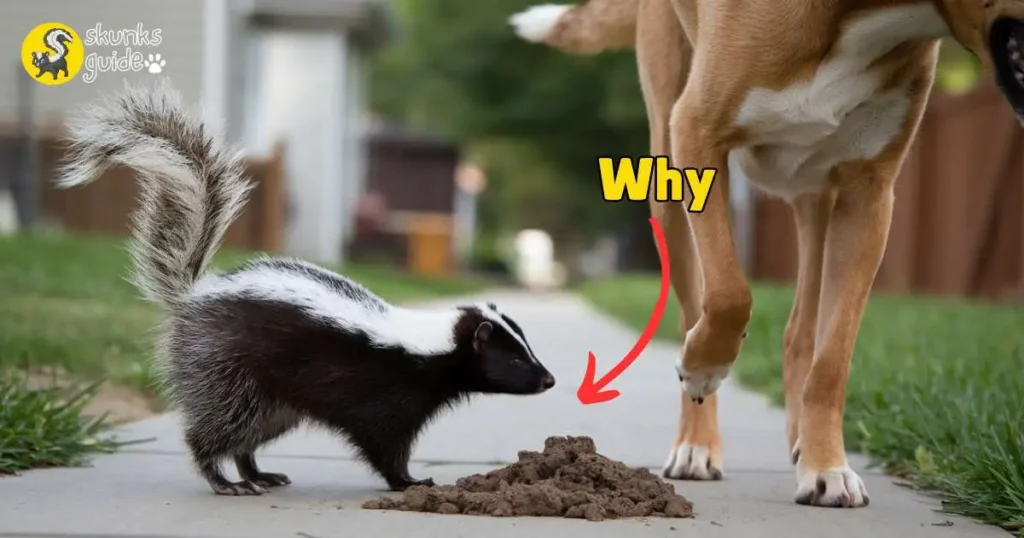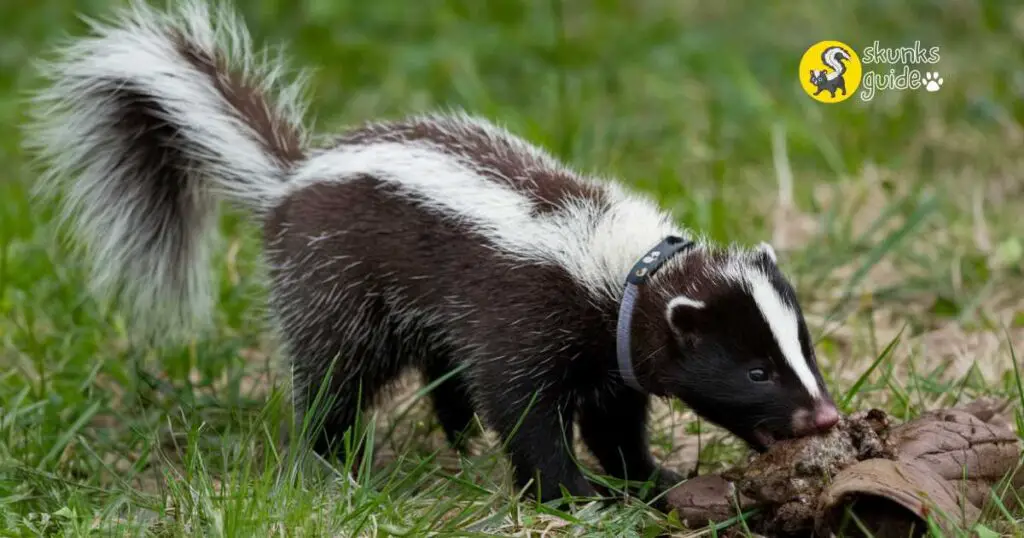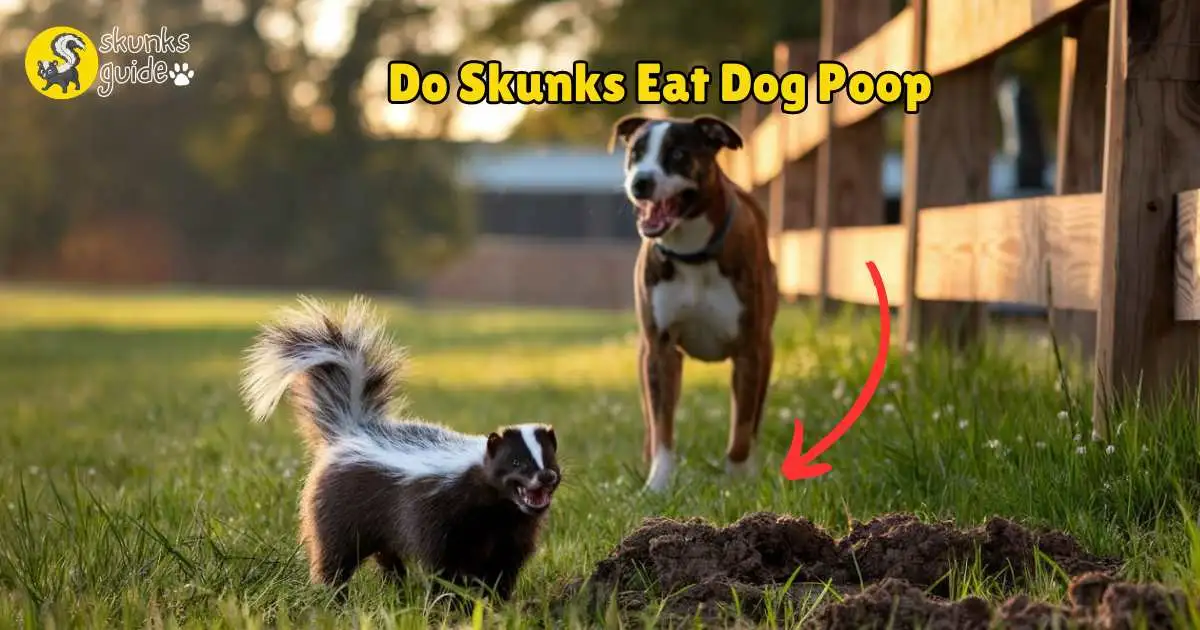Do Skunks Consume Dog Poop? 5 Important Facts
Yes, skunks can eat dog poop! I’ve learned this from my experience with skunks in the wild, where these opportunistic eaters aren’t too picky about what they find tasty. For pet owners, this might be a bit gross, but it’s important to know if you want to keep skunks out of your yard. Stick around to learn more about why skunks are attracted to dog poop and how you can prevent them from becoming unwelcome guests.
The Truth About Skunks And Dog Poop
Many pet owners wonder about skunks and their habits. Do these creatures really eat dog poop? The answer might surprise you. Skunks are opportunistic feeders. They eat whatever is available. This includes dog waste.
Attraction To Waste
Skunks are attracted to various types of waste. Dog poop is no exception. Here are some reasons why:
- Strong Odor: Dog poop has a strong smell. This attracts skunks.
- Easy Access: Dog waste is often left in yards. Skunks find it easily.
- Food Source: Skunks are scavengers. They will eat anything that smells and is easy to find.
Nutritional Scavenging
Skunks eat dog poop for nutritional reasons. They seek out undigested food. Dog poop can contain:
| Nutrient | Description |
|---|---|
| Protein | Leftover protein from dog food. |
| Fats | Residual fats can be appealing. |
| Carbohydrates | Undigested carbs may still be present. |
Skunks rely on these nutrients for energy. They have a varied diet. Eating dog poop is part of their scavenging behavior. It helps them survive in the wild.
Why Dog Poop May Appeal To Skunks
Skunks are curious creatures. They often explore their surroundings for food. One surprising snack choice is dog poop. Understanding why dog poop attracts skunks can help pet owners protect their furry friends.

Search For Protein
Dog poop can contain protein. This protein comes from the dog’s diet. Skunks need protein to thrive. Here are some reasons why dog poop is appealing:
- Leftover food: Dogs may not digest everything.
- High in nutrients: Dog poop can be nutrient-rich.
- Attracts other animals: Other scavengers may gather.
Ease Of Access
Skunks enjoy easy meals. Dog poop is often left in yards. This makes it an easy find. Key factors for skunks include:
| Factor | It requires little energy to obtain. |
|---|---|
| Location | Found in backyards and parks. |
| Abundance | Common in areas with many dogs. |
| Minimal effort | Requires little energy to obtain. |
Understanding why skunks eat dog poop helps pet owners. Keeping yards clean may deter skunks. A clean yard protects pets from potential encounters.
Health Risks For Skunks
Skunks are curious creatures. They explore their environment by tasting things. Unfortunately, this includes dog poop. Eating feces can pose serious health risks for skunks.

Parasites In Feces
Dog poop can contain various parasites. These can harm skunks in multiple ways:
- Giardia: A protozoan that can cause severe diarrhea.
- Coccidia: Another protozoan that affects the intestines.
- Hookworms: Can lead to anemia and weakness.
- Toxocara: Roundworm larvae that can affect the eyes and organs.
These parasites can reproduce quickly in a skunk’s system. Symptoms include:
- Weight loss
- Vomiting
- Dehydration
Possible Toxins
Dog poop may also contain harmful toxins. These can originate from various sources:
- Medications the dog has taken
- Fleas and tick treatments
- Food additives
Toxins can lead to serious health issues. Skunks may experience:
- Nausea
- Neurological problems
- Long-term organ damage
Staying away from dog feces is crucial for skunks’ health. Eating it can be dangerous and life-threatening.
Impact On Domestic Animals And Humans
Understanding the impact of skunks eating dog poop is crucial. It can affect both pets and humans. Let’s explore the risks and preventive measures.
Disease Transmission
Skunks can carry diseases that affect both pets and humans. Here are some common diseases:
- Leptospirosis: A bacterial infection that can spread through urine.
- Rabies: A viral disease that affects the nervous system.
- Giardia: A parasite that causes digestive issues.
Dog poop can be a source of parasites. Skunks may consume it and become infected. They can then spread these diseases to other animals or humans. This can lead to serious health issues.
Preventive Measures
Taking steps can help protect pets and humans from disease. Here are some effective measures:
- Keep dog poop cleaned up immediately.
- Use secure trash bins for disposal.
- Limit skunks in your yard with fencing.
- Use repellents to deter skunks.
- Consult a vet about vaccines for pets.
Implementing these preventive measures can significantly reduce risks. Keeping the environment clean helps protect everyone.
Understanding Skunk Behavior
Skunks are fascinating creatures. They have unique behaviors and habits. Knowing their habits can help us understand their diet. One common question is, do skunks eat dog poop? To answer this, we must explore their behavior.
Nocturnal Foraging
Skunks are primarily nocturnal. They search for food at night. This helps them avoid predators and human activity. Their foraging habits include:
- Searching for insects
- Looking for fruits and vegetables
- Scavenging for small animals
- Occasionally, eating feces, including dog poop
Skunks have a keen sense of smell. They use it to locate food. This sense helps them find dog poop, which is high in nutrients. They may eat it if other food sources are scarce.
Seasonal Eating Patterns
Skunks change their eating habits with the seasons. Understanding these patterns is crucial. Here’s a breakdown of their seasonal diet:
| Season | Food Sources |
|---|---|
| Spring | Insects, plants, and fruits |
| Summer | Berries, insects, and small animals |
| Fall | Fruits, nuts, and scavenged food |
| Winter | Stored food, insects, and carrion |
During cold months, food is scarce. Skunks may resort to eating dog poop. It provides a quick energy source. This behavior helps them survive.
Frequently Asked Questions
What Is Eating The Dog Poop In My Yard?
Animals like raccoons, foxes, or even your own pets may eat dog poop. This behavior, known as coprophagia, can be driven by hunger or nutritional deficiency. Regularly cleaning your yard can help prevent this issue and keep your pets safe from potential health risks.
What Attracts A Skunk To Your Yard?
Skunks are attracted to yards by food sources like pet food, garbage, and fallen fruit. They also seek shelter in dense vegetation or under decks. Water sources, such as bird baths, can draw them in as well. Keeping your yard clean helps deter these curious creatures.
What Wild Animals Are Attracted To Dog Poop?
Many wild animals are attracted to dog poop, including raccoons, foxes, coyotes, and bears. These animals may seek out the scent for nutrition or territorial marking. Dog waste can provide vital nutrients and information about the environment, making it an appealing find for various wildlife.
Conclusion
Skunks are opportunistic feeders and may eat dog poop if it’s available. Understanding their eating habits helps pet owners manage their yards better. Keeping your dog’s waste picked up can deter skunks and other wildlife. This simple step protects your pets and keeps your outdoor space cleaner and safer.

